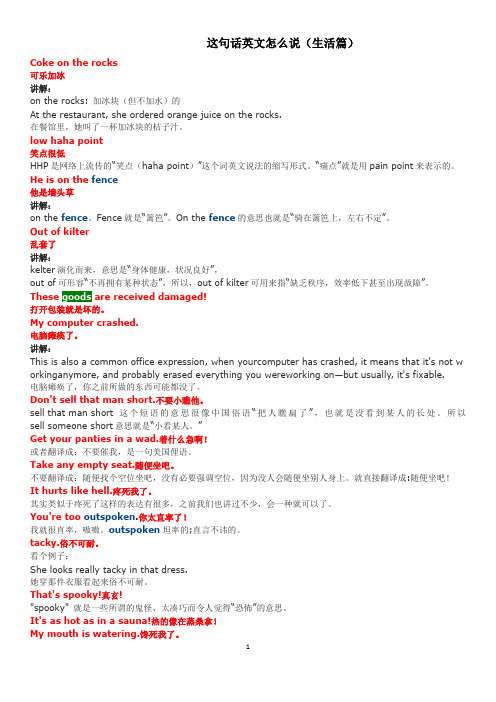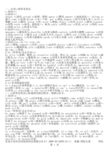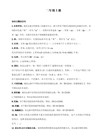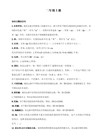have-to的用法.txt
这句话英语怎么说

这句话英文怎么说(生活篇)Coke on the rocks可乐加冰讲解:on the rocks: 加冰块(但不加水)的At the restaurant, she ordered orange juice on the rocks.在餐馆里,她叫了一杯加冰块的桔子汁。
low haha point笑点很低HHP是网络上流传的“笑点(haha point)”这个词英文说法的缩写形式。
“痛点”就是用pain point来表示的。
He is on the fence他是墙头草讲解:on the fence。
Fence就是“篱笆”。
On the fence的意思也就是“骑在篱笆上,左右不定”。
Out of kilter乱套了讲解:kelter演化而来,意思是“身体健康,状况良好”,out of可形容“不再拥有某种状态”,所以,out of kilter可用来指“缺乏秩序,效率低下甚至出现故障”。
These are received damaged!打开包装就是坏的。
My computer crashed.电脑瘫痪了。
讲解:This is also a common office expression, when yourcomputer has crashed, it means that it's not w orkinganymore, and probably erased everything you wereworking on—but usually, it's fixable.电脑瘫痪了,你之前所做的东西可能都没了。
Don't sell that man short.不要小瞧他。
sell that man short这个短语的意思很像中国俗语“把人瞧扁了”,也就是没看到某人的长处。
所以sell someone short意思就是“小看某人。
”Get your panties in a wad.着什么急啊!或者翻译成:不要催我,是一句美国俚语。
介词to的常见用法

announce to通知某人,describe to向某人描述,explain to向某人解释,express to对某人表达,mention to提及,nod to向某人点头,report to报告,say to告知,shout to对某人大叫,suggest to对某人提建议,speak to与某人交谈,talk to跟某人谈话,whisper to和某人低声耳语。
b)动词+sb./time/money+in
help sb.in帮助某人做某事,spare time/money in匀出时间或钱做某事,spend time/money in花时间或钱做某事,waste time/money in浪费时间或钱做某事。
2.be +形容词+in
be active in活跃于,be absorbed in专心致志,be busy in忙碌,be born in出生于,be concerned in牵涉,be clothed in穿着,be disappointed in对…失望,be diligent in勤于,be experienced in在…有经验,be employed in任职于,be engaged in忙碌,be expert in某方面的专家,be excellent in在…优秀,be interested in对…有兴趣,be lacking in缺乏,be rich in富有,be slow in迟缓,be successful in在某方面成功,be skilled in精于,be strict in严于,be weak in弱于。
2.be +形容词/过去分词+to
19 must, have to 和 have got to 的用法区别

You mustn’t come here without permission. 未经允许,你不能来这儿。
②表示肯定的猜测,常用于肯定句中,意思为 “一定是, 必然……”。注意must表示推断或猜测的几种情况。如:
They don’t have to buy a computer at present.
他们目前没有必要买电脑。
③have to 与have got to 常可以互换。
三、巩固练习:
从A、B、C、D四个选项中,选出可以填入空白处的最佳选项。
1.Mike,you ______ play with fire. You______ burn yourself.
A. won’t; can’t B. mustn’t; may
C. don’t have to; must D. have got to; shouldn’t
2.You ______ see the doctor,Joe. You don’t look very well.
A. must B. shall
�
A. must B. should
C. have got to D. ought to
5.Harry has been reading all day —he ______ be tired.
A. should B. has got to
C. has to D. must
Key :1-5 BABCD
C. may D. can
3.—Must I clean the window now?
—No,you ______.
A. mustn’t B. needn’t
一生最常见的to短语

on one's way to the hospital
[中考]在去医院的路上
on one's way to the cinema
[中考]在去电影院的路上
on one's way to see a film
[中考]在去看电影的路上
fall to the ground
in the years to come
[中考]在即将来临的几年里
in/with relation to
[中考]关系到
introduce to
[中考]介绍
keep to
[中考]保持,坚持
listen to
[中考]听……(讲话)
next to
[中考]紧挨着,紧靠着
occur to
[中考]说到要点,扼要地说
from door to door
[中考]挨家挨户
from tip to toe
[中考]彻头彻尾,完全
give rise to
[中考]引起,使发生
go to (the) hospital
[中考]去医院(看病)
go to college
[中考]上大学
go to school
[中考]到达车站
move over to the table
[中考]到桌前就餐
help oneself to sth.
[中考]自便,随便吃
turn to shoot
[中考]转过来投球
fly from Beijing to New York
[中考]从北京飞到纽约
go to school from Monday to Friday
英语单词。txt

loneliness n. 孤单;寂寞
highway n. 公路;大路
recover vi. & vt. 痊愈;恢复;重新获得
get/be tired of 对……厌烦
pack vi. & vt. 捆扎;包装;打行李
n. 小包;包裹
reliable adj. 可信赖的;可靠的
view n. 风景;视野;观点;见解
vt. 观看;注视;考虑
yak n. 牦牛
pillow n. 枕头;枕垫
midnight n. 午夜;子夜
at midnight 在午夜
flame n. 火焰;光芒;热情
beneath prep. 在……下面
mine n. 矿;矿山;矿井
miner n. 矿工
disadvantage n. 不利条件;不便之处
fare n. 费用
route n. 路线;路途
Mekong n. 湄公河
flow vi. 流动;流出
n. 流动;流量
ever since 从那以后
persuade vt. 说服;劝说
cycle vi. 骑自行车
graduate vi. 毕业
crack n. 裂缝;噼啪声
vt. & vi. (使)开裂;破裂
smelly adj. 发臭的;有臭味的
farmyard n. 农场;农家
pipe n. 管;导管
burst vi. (burst, burst) 爆裂;爆发
n. 突然破裂;爆发
million n. 百万
organize vt. 组织;成立
感官动词

This is the very dictionary that I want to buy,
After the fire in his house, the old car is the only thing that he owned.
A 当先行词是anything, everything, nothing (something 除外), few, all, none, little, some等代词时,或者是由every, any, all, some, no, little, few, much等代词修饰时 ,要用that
who:指代人,做主语
whom:指代人,做宾语,可以省略。它在口语和非正式用语中常用who代替,可以省略
The man who\whom you met just now is my brother.
which:指代事物,做主语、宾语。做宾语可以省略
whose:指代人、物,做定语,其后直接加名词
这些动词都不用于被动语态。如:The sweets are tasted sweet.是错误的。
(3)look, sound, smell, taste, feel这些动词后面也可接介词like短语,like后面常用名词。
Her idea sounds like fun.她的主意听起来很有趣。
get
1. get的使动用法
(1) get +宾语+to do 使某人干某事
I can't get anyone to do the work properly
(2) get +宾语+done 表示宾语与do是被动关系
【英语】英语语气词(差不多全了)
当你听到有人这么说英语:Aiya, what’s the matter with you? Wei, are you John? Aiyo, I hurt my head. 你会感觉怎么样?说的是英语,发出的语气词却是地道的汉语。
这种现象太普遍了。
原因就在于,我们对老外的语气词太不了解了。
所以要想把英语讲得有洋味儿,你首先要学会像老外那样哼哼哈哈!下面是老外常用的语气词,快学会它们吧:Ah [ɑ:] 表痛苦、欢乐、懊悔、憎恨、厌恶、惊讶、遗憾、蔑视等Aha [ɑ:'hɑ:] 表满意、快乐、胜利、得意、惊讶等;常含有冷嘲热讽或愚弄意1. Aha! That's it. Now I know what to do. 啊哈!就是这样。
现在我知道该怎么做了!2. Aha, so there you are! 啊哈,原来你在这里。
Ahem [ə'hem] 咳嗽声,唤起注意, 或表示怀疑Ahem, I wonder if I can raise this problem with you now. 呃哼,我现在能否向您提及这问题。
Bah! [ bɑ: ] 轻蔑,厌恶Bah! You've wasted my time. Goodbye. 呸!你在浪费我的时间,再见。
Blah [bla:] 反复地说,什么什么的1. All she does is go "blah-blah-blah" all night, but she never says anything worth remembering the next morning. 她整夜说个不停,但没有一句值得记到第二天早上的话。
2. You have to listen to Charles talk about how bad the Rockets are and that it needs to be T-Mac's team, blah blah blah. 你必须听着巴克力说火箭有多么糟糕,还有这应该是麦迪一个人的球队,什么什么的。
商务英语案例
商务英语案例.txt B: I know. But pricing has to be based on what customers want too, which differs fromplace to place and time to time.A: Yes, experience shows the same product is priced differently in different markets.But why so much higher in this market?B: There are many rich people in this area, so a skimming price is OK -- and evenneeded, because they think only a high price means a good product.A: But the market prices for other similar products are much lower. Buyers will noticethe flexibility in the price structure, and buy from other companies.B: I don't think so. I think the others will have to raise their price ceiling tomake customers believe that their products are as good as ours.A: 我真的认为这个价钱太高。
价钱是要根据成本和你所想要的利润而定。
B: 我知道。
但是定价也须以顾客的需要为基础,而这种需要是会因时因地而异的。
A: 没错。
根据经验,相同产品在不同的市场会订出不同的价钱。
但为什么在这个市场要订这么高?B: 这个地区多的是有钱人,所以最高利润价行得通,甚至可以说是必要的。
附加疑问句
附加疑问加问句构成,表示问话人有一定的看法,但并不完全肯定,需要对方证实。反意的附加疑问句的规则是: 当陈述部分为肯定句时,附加问句部分用否定形式;当陈述部分为否定句时,附加问句部分用肯定形式。非反意的附加疑问句的陈述部分和附加问句部分要么同是肯定的,要么同是否定的。如:
2)对已发生的过去情况的推测,若陈述句谓语部分有“must have done”,而且有表示过去的时间状语,问句部分用didn't;若没有表示过去的时间状语,问句部分用haven't或hasn't。如:
They must have gone there last night,didn't they?
九、含had better的陈述句,附加部分用助动词had; 含would 的陈述句,附加部分动词用would。例如:
You'd better go home now, hadn't you? 你最好现在回家,好不好?
You'd like to see the film, wouldn't you? 你很想看电影,是吗?
They must have arrived by now,haven't they?(根据by now来判断)
They must have been to the Great Wall,haven't they?
3)若是被动,应按被动结构来处理。如:
The room must have been cleaned yesterday,wasn't it?
I believe that you will enjoy the party, won't you? 我相信你会喜欢这次聚会的,不是吗?
272个常用英语单词的用法和注意事项
52. condition 一般用法: 表示生活、工作等的条件或状况。
特殊注意: on condition that表示只要,条件状语从句。
53. content 一般用法: be content with/to do
特殊注意: 表语性形容词,在句中只能作表语,不能作定语。
54. cost 一般用法: sth. cost sb. some money
特殊注意: 修饰cost要用副词high或low.
38. care 一般用法: take care of; with care; care for/about
特殊注意: care about表示在乎,常用于否定句;care for表示关心,喜爱,常用于肯定句。
39. carry 一般用法: carry表示搬运;carry on表示坚持;carry out表示执行。
【本书由TXT之梦(夏果)为您整理制作
更多txt好书 敬请登录】
=======================================
1. able 一般用法: be able to do
特殊注意: 反义词unable表示不能,而disabled表示残疾的。
10. among 一般用法: 用在三者或三者以上的群体中。
特殊注意: 还可以表示其中之一,如:He is among the best.
11. and 一般用法: 用于连接两个词、短语、句子或其他相同结构。
特殊注意: 与祈使句搭配时往往可以表示条件。如:Work hard, you'll succeed sooner or later.
- 1、下载文档前请自行甄别文档内容的完整性,平台不提供额外的编辑、内容补充、找答案等附加服务。
- 2、"仅部分预览"的文档,不可在线预览部分如存在完整性等问题,可反馈申请退款(可完整预览的文档不适用该条件!)。
- 3、如文档侵犯您的权益,请联系客服反馈,我们会尽快为您处理(人工客服工作时间:9:00-18:30)。
have to 用法分析
have to是情态动词,意思是“必须;不得不”,表示客观要做的事情,后接动词原形。
一、have to的单数和复数
have to虽是情态动词,但有人称或数的变化。
一般现在时第三人称单数用has to,其他人称用have to。
例如:
You have to go with Tom.你得跟汤姆去。
She has to answer this question. 她不得不回答这个问题。
二、have to的肯定式
have to的肯定式由“have to+动词原形”构成。
例如:
I have to tell him the news.我得告诉他这个消息。
She has to walk home.她不得不走回家。
三、have to的否定式
have to的否定式由“don’t have to+动词原形”或“doesn’t have to+动词原形”构成。
例如:
You don’t have to do like this.你不必这样做。
He doesn’t have to be there on time. 他不必按时到那里。
have to的否定式还可在have/has后面加not (仅限于一般现在时和一般过去时)。
例如:
He hasn’t to go there.他不必去那里。
I haven’t to get up early.我不必早起床。
四、have to的疑问式
have to的一般疑问式通常由“Do/ Does + 主语+have to+动词原形+其他成分”构成,肯定回答用do或does;否定回答用don’t(have to)或doesn’t(have to)。
例如:
①–Do you have to go now?你现在就得去吗?
–Yes, I do.是的。
②–Does he have to stay home? 他必须留在家里吗?
–Yes, he does. 是的。
(No, he doesn’t (have to) . 不,他不必留在家里。
]
五、have to的时态
have to可用于各种时态。
其一般过去时的肯定式是had to,否定式是didn’t have to;一般将来时的肯定式是will have to,否定式是won’t have to。
例如:
He said he had to see me about something important.他说他有重要的事情不得不见我。
He said they didn’t have to borrow 200 yuan from John.他说他们不必向约翰借二百元。
You will have to do that again.你得重做那件事。
She won’t have to go with you. 她不必跟你去。
六、have to与 must的区别
1. have to有人称和数的变化,即第三人称单数用has to,其他人称用have to;而must没有人称或数的变化。
例如:
He has to go there.他必须去那里。
She must be off now.她现在必须走了。
2. have to有时态的变化,must没有。
例如:
He told me that I must be at the station by ten.他告诉我必须十点前到达车站。
He had to pay for it.他不得不赔偿。
3. have to强调客观上“不得不”做某事;must指主观上“必须”做某事。
例如:
We must study hard.我们一定要努力学习。
He had to go on foot because there was something wrong with his car.因为他的汽车坏了,他不得不走着去。
